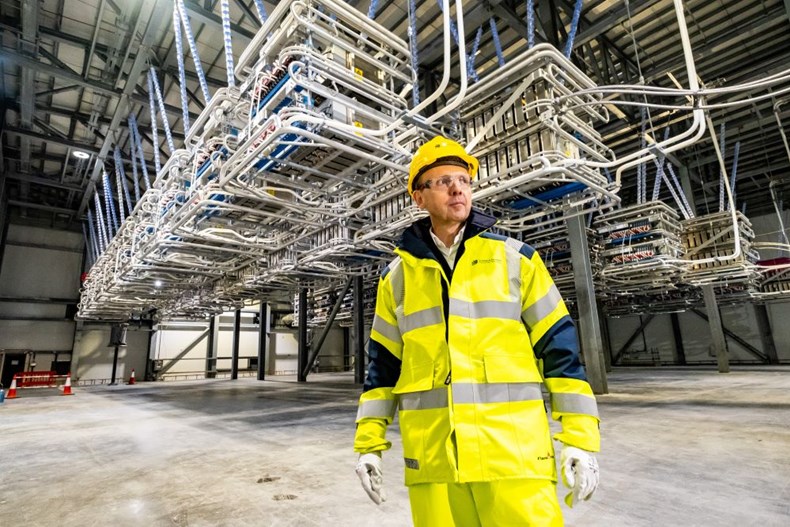How clean energy will help deliver UK economic growth
Alistair Phillips-Davies, Chief Executive
| SSE
SSE’s Chief Executive writes on the once-in-a-generation opportunity to transform our energy system and kickstart economic growth through partnership between industry and the new government.
How to actually deliver UK economic growth
Prior to the election, Labour had committed to tackling the planning system head-on in order to unlock economic growth and get Britain building again.
If Rachel Reeves’ first speech as Chancellor is anything to go by, winning a commanding majority has only galvanised that intent.
The challenge is for policymakers to deliver at pace across the whole of the UK, including in Scotland where reform is devolved but is also urgently needed.
Why we need planning reform urgently
Let me give you two examples of how planning acts as a drag on economic growth and jobs.
It currently takes around 12 years to deliver a large offshore wind farm in UK waters. But only two or three years of that is the construction phase.
And when it comes to electricity grids that span the country, it only takes one local authority in Scotland to object to a project for it to go to a public inquiry, adding costs and years of delay.
No one wants to avoid appropriate scrutiny and proper engagement with communities, but allowing decision making to drag on for years suits nobody, and setting a reasonable 12-month limit is surely sensible for everyone involved, as is giving ministers greater discretion where projects are clearly deemed to be in the national interest.
Making the UK the easiest place in the world to invest and actually build projects
But planning reform should be just one of a number of actions to deliver sustainable growth, enabled by focusing on areas in which UK PLC has a genuine comparative advantage.
Even better if this is in an area that has strong growth prospects, can attract significant investment into the UK, and create good jobs for people.
 Alistair Phillips-Davies, Chief Executive of SSE
Alistair Phillips-Davies, Chief Executive of SSE
Clean energy delivers on all of these, and we have a real opportunity to be world leaders in one of the fastest-growing and most important industries of the 21st century – something we will have to do if we’re to achieve the new government’s ambition for clean power by 2030.
Why?
We have some of Europe’s best renewable resources, able to generate vast amounts of homegrown clean energy, protecting us from overdependence on imported fossil fuels and the regimes that control those resources.
Thanks to our experience in oil and gas, we have a highly skilled workforce and the infrastructure beneath the North Sea to store millions of tonnes of emissions – critical to developing new industries like carbon capture and hydrogen.
And we have a strong track record of building our electricity grid, with a plan to build new networks where they are needed to connect new renewables, homes and businesses.
This is a great springboard for growth and energy security, but we need to turn all this potential into jobs and investment across the UK.
An early signal of intent would be to deliver a record 20GW of offshore wind in the next two government auctions, enough to power the equivalent of every home in the country.
That would immediately tell international investors that the UK is serious about leading the world in clean technology and help bring thousands of good manufacturing jobs back to the UK as we become a leading hub for the global industry.
But to achieve that, we need to get more projects consented and bidding into the auctions – underlining once more the need for faster planning decisions across the whole of the UK.
Creating good jobs here in the UK
And this is not just a promise of jam tomorrow; it is already happening.
In Nigg, in the Scottish Highlands, a long-term contract with SSE’s Transmission business helped Sumitomo decide to start building a new factory to make the high-voltage cables that will be essential to plugging our renewable energy resources into the grid.
It is a £350m commitment to an area that has previously suffered from the decline in oil and gas, reshoring manufacturing that would otherwise have been done overseas. And it’s been made possible by clear signals to investors that the pipeline of projects is coming.
With the right commitment from government and industry, we can do much, much more, creating economic opportunities in communities from Shetland to the Isle of Wight.
We need to get a move on
Having worked in the energy industry for almost 30 years, I have never been more excited about the prospects for this country.
As one of the largest investors in the UK, SSE alone has a current investment programme of more than £20bn, but we are ready to go further, and many others in the industry will join us.
Britain has no shortage of opportunities. But we need to make them happen. If we can deliver on the clean energy mission, the growth will come. There’s a long way to go, but unblocking the planning gridlock is the right place to start.
